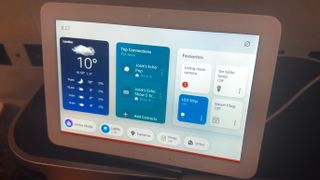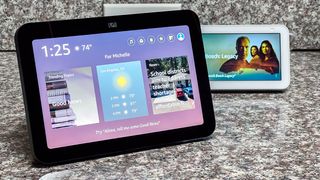Amazon Echo Hub vs Amazon Echo Show 8 (3rd gen): Two Alexa smart displays compared
We compare Amazon’s shiny new smart home control center with the latest Echo Show

Display: 8-inch, 1280 x 800
Speakers: Pair of top ported full range speakers with stereo playback
Camera: None
Connectivity: Wi-Fi, Bluetooth
Voice assistant: Alexa
Hub functionality: Yes (Zigbee + Matter + Thread border router)
Dimensions: 7.9 x 5.3 x 0.5 inches / 202 x 137 x 15 mm
Weight: 12.87 oz / 365 g
For
- Simple yet sophisticated design
- Excellent connectivity
- Easy set-up and use
Against
- UI still a bit buggy
- Not suitable for entertainment

Making smart speakers a tad redundant
For
- Excellent audio
- Fast performance
- Added Thread and Zigbee support
- Sharp, bright and responsive touch display
- Adaptive Content, Visual ID personalization, and other features are nifty
Against
- Slightly more expensive than predecessor
- Display bezels are still thick
- Same camera, same display resolution
The Echo Hub is Amazon’s latest attempt at bringing touchscreen control to your smart home devices. But, despite its appearance and functionality, the Amazon Echo Hub is not a new member of the Echo Show family of smart displays - it's a whole-home smart control panel with limited entertainment specs. On the other hand, Echo Show products like the Echo Show 8 (Gen 3) are primarily designed to act as both a smart speaker and a media-streaming display for parts of your home where you wouldn’t typically have a television, like on a kitchen counter, whereas the slimmer, more tablet-like Echo Hub is intended to be wall-mounted.
That said, both the Echo Hub and Amazon Echo Show 8 (3rd gen) have an 8-inch touchscreen display. Both also connect to smart home devices and both can stream audio and video from a variety of services. They also tap into Amazon’s communication services, like Drop In, and they work with Ring security cameras and video doorbells. But their software and user interfaces are somewhat different, and while the Echo Hub is the slightly more expensive of the two, the Echo Show 8 has better audio.
Struggling to pick which Amazon smart display to buy? We don’t blame you, but thankfully TechRadar is here to help. Read on for a detailed comparison between the new Amazon Echo Hub and Echo Show 8 (3rd gen), to help you decide which is best for you and your smart home.
Amazon Echo Hub vs Amazon Echo Show: specs comparison
Here’s an at-a-glance look at the key specs of both the Echo Hub and Echo Show 8 (3rd gen):
| Row 0 - Cell 0 | Amazon Echo Hub | Amazon Echo Show 8 (3rd gen) |
| Display: | 8-inch, 1280 x 800 | 8-inch, 1280 x 800 |
| Speakers: | Pair of top-ported, full-range stereo speakers | 2x 2-inch neodymium stereo speakers with passive bass radiator |
| Camera: | None | 13MP centered camera with built-in shutter |
| Connectivity: | Wi-Fi, Bluetooth | Wi-Fi, Bluetooth |
| Voice assistant: | Alexa | Alexa |
| Hub functionality: | Yes (Zigbee + Matter + Thread border router) | Yes (Zigbee + Matter + Thread border router) |
| Dimensions: | 7.9 x 5.3 x 0.5in / 202 x 137 x 15 mm | 7.9 x 5.5 x 4.2 inches / 200 x 139 x 106 mm |
| Weight: | 12.87 oz / 365 g | 36.6 oz / 1.04 kg |
Amazon Echo Hub vs Amazon Echo Show 8: price and availability
The new Echo Hub and latest, third-generation Echo Show 8 arrived within a few months of each other. The Echo Show 8 landed first back in October 2023, and was followed in February 2024 by the Echo Hub. Both are available now in the US and UK, but the Echo Show 8 (Gen 3) isn't available in Australia as of writing.
The Echo Show 8 is the cheaper of the two and priced at $149.99 / £149.99 (about AU$230). The new Echo Hub costs slightly more, at $179.99 / £169.99 / AU$329. That said, Amazon is famous for cutting the prices of its Echo products, so you should expect to see both of these smart displays reduced on several occasions throughout the year. The best prices are likely to arrive during one of Amazon’s Prime Day sales events.
Something worth noting is how the Echo Hub is designed to be wall-mounted. It comes with a mounting bracket in the box, but if you want to sit it on a flat surface like a shelf or kitchen counter, you’ll need to purchase a compatible stand. Meanwhile, the Echo Show is solely designed to sit on a flat surface, with no additional stand required - but it's not mountable.
Amazon Echo Hub vs Amazon Echo Show: design and features
Although it only arrived in late 2023, the latest Echo Show 8 retains a design very similar to all of its predecessors. Its 8-inch screen is surrounded by a rather large bezel that houses a camera for video calls or as an (optional) indoor security camera. The curved rear of the unit is finished in the same fabric as other Echo smart speakers, and there are buttons along the top for changing the volume, muting the microphone, and opening or closing the camera cover.
Made partially from recycled materials (29% to be precise, according to Amazon), the Echo Show 8 is solidly built and, while the aesthetic is inoffensive, that unfortunately large screen bezel makes the whole thing feel rather dated. Like other Echo Shows, this model is powered from a wall outlet and does not have a battery.
As for features, the Echo Show 8 is best described as a touchscreen that gives access to the Amazon Alexa voice assistant, plus decent smart home control and the ability to stream audio and video. The Echo Show is essentially what happens when a screen is added to a regular Echo smart speaker, so when you ask Alexa a question it’ll answer out loud, but also show answers on the display. The screen can also be used for keeping track of timers (handy in the kitchen), viewing live video streams from security cameras, showing song lyrics, placing video calls, and streaming content from Prime Video. You can also look up recipes and there’s an interface for controlling smart home devices like smart lights, smart plugs, and smart thermostats.
The new Echo Hub also has an 8-inch touchscreen, but that is where most of the similarities end in terms of design. This is a device intended to be wall-mounted, and as such it is much slimmer than the Echo Show 8. It even comes with integrated cable management and a detachable bracket for wall-mounting – but if you want to sit it on a shelf, a table or the kitchen counter you’ll have to pay extra for a third-party stand. Amazon really wants the Echo Hub stuck on your wall, and its marketing images even suggest you power it with a cable (USB-C or Ethernet) buried in the wall. It looks seamless, but requires a bit of DIY.
There is no camera on the Echo Hub, so it cannot be used for video calls. In its place is a proximity sensor that changes what’s on the screen when it sees you’re nearby. By default the screen shows a large clock and little else; this then switches to a smart home command center, complete with shortcuts for some of the best smart devices, when you approach. The Echo Hub has a pair of speakers, but these aren’t as powerful as those used by the Echo Show 8 - instead, they are best used for hearing the Alexa voice assistant or having a conversation with a visitor via a video doorbell, rather than music or video.
The overall design is fairly inoffensive, but the 14mm screen bezels are somewhat prominent and make the brand-new Echo Hub feel dated, just as the large bezels do on the Echo Show 8. Buttons on the side of the Echo Hub are used to adjust the volume and mute the microphone.
Amazon Echo Hub vs Amazon Echo Show: performance and software
Both Echo devices run the same Amazon operating system, but their user interfaces are entirely different. The Echo Show 8 looks a lot like that of other Show models, which puts Alexa front-and-center, makes it relatively easy to cue up media, and has handy features like automatic panning and zooming to keep you in frame during a video call. Sound quality and volume are also good, with the Echo Show 8 easily capable of room-filling audio.
The third-generation Echo Show 8 uses a more powerful processor than earlier models, which makes for a far more responsive user interface. Alexa’s answers arrive quickly, smart home devices are fast to respond and movies from Amazon Prime Video begin without delay.
With regard to smart home connectivity, the Echo Show 8 (3rd gen) has support for Matter, Thread and Zigbee, so can control pretty much anything. The only real letdown is how it has the same display as the previous-generation model, which is bright and sharp but more reflective than we’d like it to be.
Now to the Echo Hub, and although it has the same screen and software as the Echo Show 8, the user interface is completely different. Amazon has finally leaned further into the smart home sector, and with the Echo Hub has created a device with the central purpose of controlling your home. The UI reflects this, with a home screen full of controls for cameras, lights, and smart plugs. There’s also tight integration with Amazon Alexa’s routines function for smart home automation, and there’s support for Matter, Thread, and Zigbee, plus Bluetooth and the aforementioned option for power-over-Ethernet. A benefit of the Echo Show is how the Hub’s interface is far less cluttered, with no Amazon bloatware and no invasive adverts either.
It’s a solid first attempt at a new smart home interface from Amazon, but one we found to be slightly buggy and slow at times. We wish Amazon had given the Echo Hub a more powerful processor to speed things up a bit, and some of Alexa’s abilities are missing. For example, while you can ask the assistant to change the color of a room full of smart bulbs from different companies, the Hub can’t manage this without you first creating a routine for that specific color. We also wish the Echo Hub offered more options for customizing the interface, as it isn’t possible to change the order of smart devices in each room and put the most-used at the top.
We know improvements are on the way via software updates, so hopefully Amazon’s first attempt isn’t entirely representative of what owning an Echo Hub will be like in, say, a year. We really hope those improvements come soon, because installing the Echo Hub as Amazon suggests – with a wall mount and hidden cable – means a larger commitment than simply placing the Hub on a shelf. As well as software improvements, we also hope future generations of Hub are the same size as the original, so can fit onto the same wall mount with minimal effort.
Amazon Echo Hub vs Amazon Echo Show: verdict
So which should you go for? Both of these Amazon devices bring the Alexa voice assistant to an 8-inch display and both control smart home devices. However, they also have some major differences.
The cheaper Echo Show 8 is better suited to video and music playback than the Echo Hub, thanks to its more impressive speakers. It can also handle video calls and act as an indoor security camera too, both things the Echo Hub isn’t capable of. But if you want a wall-mounted touchscreen for controlling your smart home, the Hub is the product for you. The software is custom-built to do exactly that, and while Alexa is also present, the user interface is designed so that voice commands aren’t always needed.
There’s only $30 between their prices, so that should be less of a consideration than comparing, say, a much cheaper Echo Dot smart speaker and an Echo Show display. We instead urge you to decide what you want from your Echo display; do you want a device for watching videos and following recipes in the kitchen, or do you want a wall-mounted display for checking on your security cameras and adjusting the lights throughout your home?
Ultimately, the newer Echo Hub holds more intrigue for us. We’re keen to see what software improvements Amazon has planned, and what future generations of Echo Hub might look like. We also like how the user interface is cleaner than the Echo Show’s and lacks those annoying adverts. There’s no right or wrong answer here, but buyers who prioritize streaming and video calls should look at the Echo Show 8, while readers looking for a smart home control center should go for the Echo Hub.
Get daily insight, inspiration and deals in your inbox
Get the hottest deals available in your inbox plus news, reviews, opinion, analysis and more from the TechRadar team.
Alistair Charlton is a freelance technology and automotive journalist based in London. His career began with a stint of work experience at TechRadar back in 2010, before gaining a journalism degree and working in the industry ever since. A lifelong car and tech enthusiast, Alistair writes for a wide range of publications across the consumer technology and automotive sectors. As well as reviewing dash cams for TechRadar, he also has bylines at Wired, T3, Forbes, Stuff, The Independent, SlashGear and Grand Designs Magazine, among others.

